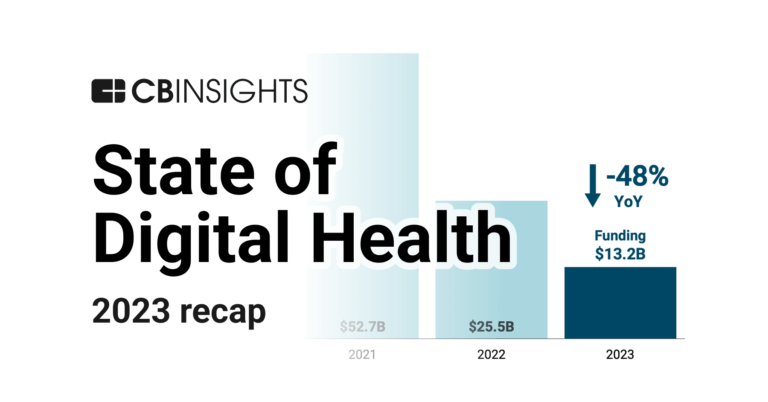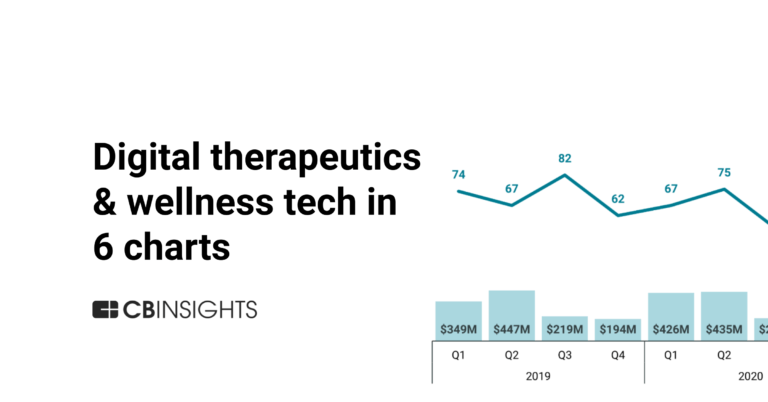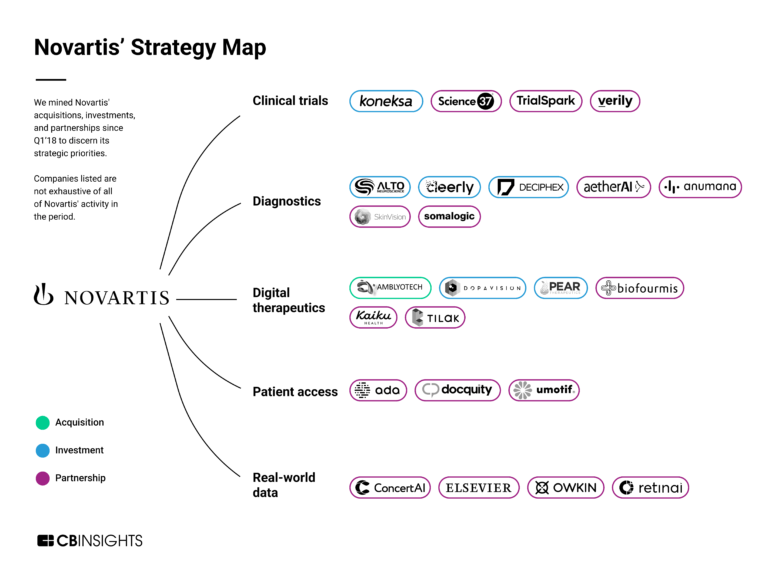
Pear Therapeutics
Founded Year
2013Stage
Asset Sale | AssetsPurchasedTotal Raised
$334.94MAbout Pear Therapeutics
Pear Therapeutics focuses on developing and commercializing software-based medicines, known as prescription digital therapeutics (PDTs), within the healthcare sector. The company offers clinically validated software-based therapeutics designed to provide better outcomes for patients, engagement and tracking tools for clinicians, and cost-effective solutions for payers. Pear Therapeutics primarily serves the healthcare industry, focusing on patients with substance use disorder, opioid use disorder, and chronic insomnia. It was founded in 2013 and is based in Boston, Massachusetts. In April 2023 Pear Therapeutics filed for bankruptcy.
Loading...
Loading...
Research containing Pear Therapeutics
Get data-driven expert analysis from the CB Insights Intelligence Unit.
CB Insights Intelligence Analysts have mentioned Pear Therapeutics in 3 CB Insights research briefs, most recently on Jan 25, 2024.

Jan 25, 2024 report
State of Digital Health 2023 ReportExpert Collections containing Pear Therapeutics
Expert Collections are analyst-curated lists that highlight the companies you need to know in the most important technology spaces.
Pear Therapeutics is included in 3 Expert Collections, including Digital Health 50.
Digital Health 50
300 items
The most promising digital health startups transforming the healthcare industry
Digital Health
11,068 items
The digital health collection includes vendors developing software, platforms, sensor & robotic hardware, health data infrastructure, and tech-enabled services in healthcare. The list excludes pureplay pharma/biopharma, sequencing instruments, gene editing, and assistive tech.
Precision Medicine Tech Market Map
160 items
This CB Insights Tech Market Map highlights 160 precision medicine companies that are addressing 9 distinct technology priorities that pharmaceutical companies and healthcare providers face.
Pear Therapeutics Patents
Pear Therapeutics has filed 14 patents.
The 3 most popular patent topics include:
- psychiatric diagnosis
- cognitive behavioral therapy
- antidepressants

Application Date | Grant Date | Title | Related Topics | Status |
|---|---|---|---|---|
4/11/2023 | 2/27/2024 | Data security, Monoclonal antibodies, Cryptographic hash functions, Health informatics, Medical terminology | Grant |
Application Date | 4/11/2023 |
|---|---|
Grant Date | 2/27/2024 |
Title | |
Related Topics | Data security, Monoclonal antibodies, Cryptographic hash functions, Health informatics, Medical terminology |
Status | Grant |
Latest Pear Therapeutics News
Sep 10, 2024
| DelveInsight News provided by Share this article Share toX The BTK inhibitors market is poised for remarkable growth driven by advancements in oncology and autoimmune disease treatments. With expanding research and development efforts, these inhibitors promise significant therapeutic benefits, propelling market expansion in the coming decade. LAS VEGAS, Sept. 10, 2024 /PRNewswire/ -- DelveInsight's BTK Inhibitors Market Insights report includes a comprehensive understanding of current treatment practices, emerging BTK inhibitors, market share of individual therapies, and current and forecasted BTK inhibitors market size from 2020 to 2034, segmented into 7MM [the United States, the EU4 (Germany, France, Italy, and Spain), the United Kingdom, and Japan]. Key Takeaways from the BTK Inhibitors Market Report As per DelveInsight's analysis, the total market size of BTK inhibitors in the 7MM is expected to surge significantly by 2034. IMBRUVICA generated approximately USD 3.5 billion in revenue globally and USD 2.6 billion in the US in 2023. Leading BTK inhibitor companies such as Novartis, Ono Pharmaceutical, Beijing Innocare Pharmaceutical, and others are developing novel BTK inhibitors that can be available in the BTK inhibitors market in the coming years. Some of the key BTK inhibitors in the pipeline include Remibrutinib (LOU064), Tirabrutinib (ONO-4059), Orelabrutinib (ICP-022), and others. In January 2024, the FDA granted Fast-Track Designation to the novel BTK degrader NX-5948 for the treatment of adult patients with relapsed or refractory chronic lymphocytic leukemia (CLL) or small lymphocytic lymphoma (SLL) after at least two lines of therapy, including a BTK inhibitor and a BCL2 inhibitor. Discover which therapies are expected to grab the BTK inhibitors market share @ BTK Inhibitors Market Report BTK Inhibitors Market Dynamics The BTK inhibitors market has experienced significant dynamics driven by advancements in oncology and autoimmune disease treatments. One of the primary drivers of the BTK inhibitors market is the increasing incidence of cancers such as leukemia, lymphoma, and multiple myeloma, where these inhibitors have shown promising results in clinical trials. The demand for more effective and targeted therapies, coupled with the rising prevalence of these diseases globally, has spurred research and development efforts in this field. Moreover, the competitive landscape within the BTK inhibitors market is dynamic, characterized by the presence of several pharmaceutical companies striving to develop novel BTK inhibitors with improved efficacy and safety profiles. These companies often engage in strategic collaborations and partnerships to enhance their research capabilities and expand their market presence. Regulatory approvals also play a crucial role in shaping the market dynamics of BTK inhibitors. As regulatory bodies worldwide increasingly approve these inhibitors for various indications, including both hematological malignancies and autoimmune diseases, it opens up new avenues for market growth and expansion. Additionally, the market dynamics are influenced by factors such as pricing strategies, reimbursement policies, and patient access to these therapies. Pharmaceutical companies often face challenges related to pricing pressures and market access hurdles, which impact their commercialization strategies for BTK inhibitors. Looking ahead, the BTK inhibitors market is poised for continued growth, driven by ongoing clinical research, technological advancements, and the evolving treatment landscape in oncology and immunology. The introduction of next-generation BTK inhibitors and their potential applications in combination therapies are expected to further shape the future dynamics of this promising market. BTK Inhibitors Treatment Market Over the past ten years, numerous studies, both in preclinical and clinical settings, have assessed the effectiveness of BTK inhibitors either alone or in combination with standard chemotherapy, immunotherapy, or targeted therapies across various cancers. This research aims to expand the range of approved uses and increase market opportunities. Currently, FDA-approved BTK inhibitors include IMBRUVICA (ibrutinib), CALQUENCE (acalabrutinib), BRUKINSA (zanubrutinib), and JAYPIRCA (pirtobrutinib). Ibrutinib, the pioneering BTK inhibitor, was approved as a breakthrough therapy in 2013 for its efficacy and selectivity. Subsequently, second-generation BTK inhibitors like acalabrutinib and zanubrutinib, designed to minimize off-target effects, received FDA approval in 2017 and 2019, respectively. Honigberg initially documented the effectiveness of ibrutinib in treating B-cell lymphoma. Subsequently, to address off-target side effects and emerging resistance, several selective second-generation BTK inhibitors were developed. Harrington, like Honigberg, assessed the pharmacodynamic impact of acalabrutinib, confirming its potent inhibition of BTK activation and suppression of CLBL1 cell proliferation—a canine B-cell lymphoma model. The overall response rate (ORR) stood at 25%, with a median progression-free survival (PFS) of 22.5 days. BeiGene introduced zanubrutinib in 2012 as a next-generation BTK inhibitor, using a structure-activity relationship approach that identified compound 31a from a series of pseudo-pyrimidinone derivatives due to its robust potency, selectivity, and favorable pharmacokinetics and pharmacodynamics in vitro. In 2023, the FDA approved pirtobrutinib, the first non-covalent BTK inhibitor sanctioned for relapsed or refractory mantle cell lymphoma. Experimental and clinical findings increasingly highlight BTK's role not only in B-cell malignancies but also in solid tumors like breast, ovarian, colorectal, and prostate cancers. Furthermore, heightened BTK activity correlates with autoimmune diseases, suggesting potential benefits of BTK inhibitors in treating conditions such as rheumatoid arthritis, systemic lupus erythematosus, multiple sclerosis, Sjögren's syndrome, allergies, and asthma. Learn more about the FDA-approved BTK inhibitors @ BTK Inhibitors Drugs Key Emerging BTK Inhibitors and Companies Several key players, including Novartis, Ono Pharmaceutical, Beijing Innocare Pharmaceutical, and others, are involved in developing drugs for BTK inhibitors for various indications such as Chronic Spontaneous Urticaria, Multiple Sclerosis, B-cell Malignancies, Primary CNS Lymphoma, Refractory Primary Central Nervous System Lymphoma and others. Remibrutinib is a highly specific oral inhibitor of Bruton's tyrosine kinase (BTK), which interrupts the BTK pathway to prevent the release of histamine responsible for symptoms like itching, hives, and swelling. Phase II trials have shown that remibrutinib acts quickly and maintains effectiveness in patients with moderate to severe chronic spontaneous urticaria (CSU). It has been well-tolerated across all tested doses in Phase II, with Phase III REMIX data confirming these findings. Beyond CSU, remibrutinib is under investigation for other immune-mediated conditions such as multiple sclerosis and hidradenitis suppurativa. If approved, remibrutinib could offer a promising oral alternative to complement XOLAIR (omalizumab), the sole injectable biologic currently approved for CSU treatment. Tirabrutinib, an oral small molecule developed by Ono Pharmaceutical and Gilead Sciences, functions as a Bruton's tyrosine kinase (BTK) inhibitor intended for treating autoimmune disorders and hematological malignancies. This medication binds irreversibly and covalently to BTK in B cells, thereby inhibiting abnormal B cell receptor signaling involved in B cell-related cancers and autoimmune conditions. In March 2020, oral VELEXBRU received approval in Japan for treating recurrent or refractory primary central nervous system lymphoma. The FDA has also designated tirabrutinib as an orphan drug for primary central nervous system lymphoma (PCNSL) treatment, as per Ono Pharma USA. The anticipated launch of these emerging therapies are poised to transform the BTK inhibitors market landscape in the coming years. As these cutting-edge therapies continue to mature and gain regulatory approval, they are expected to reshape the BTK inhibitors market landscape, offering new standards of care and unlocking opportunities for medical innovation and economic growth. To know more about BTK inhibitors clinical trials, visit @ BTK Inhibitors Treatment Drugs BTK Inhibitors Overview BTK inhibitors, or Bruton's tyrosine kinase inhibitors, represent a significant advancement in the treatment of certain cancers and autoimmune diseases. Bruton's tyrosine kinase is a key enzyme involved in B-cell receptor signaling, crucial for the proliferation and survival of B-cells. By inhibiting BTK, these drugs effectively suppress B-cell activity, thereby disrupting the pathological processes driving diseases like chronic lymphocytic leukemia (CLL), mantle cell lymphoma (MCL), and autoimmune disorders such as rheumatoid arthritis. Clinically, BTK inhibitors have shown remarkable efficacy in targeting malignant B-cells while sparing normal immune function to a considerable extent. Ongoing research continues to explore their potential in other malignancies and autoimmune conditions, highlighting the evolving role of BTK inhibitors in modern oncology and immunotherapy. BTK Inhibitors Epidemiology Segmentation The BTK inhibitors market report proffers epidemiological analysis for the study period 2020–2034 in the 7MM segmented into: Total Prevalent Cases in Selected Indications for BTK Inhibitors Total Eligible Patient Pool for BTK Inhibitors in Selected Indications Total Treated Cases in Selected Indications for BTK Inhibitors BTK Inhibitors Report Metrics Multiple Sclerosis Market Insight, Epidemiology and Market Forecast – 2034 report deliver an in-depth understanding of the disease, historical and forecasted epidemiology, as well as the market trends, market drivers, market barriers, and key multiple sclerosis companies, including Immune Response BioPharma, Inc., Clene Nanomedicine, Genzyme, ImStem Biotechnology, Rho, Inc., Bristol-Myers Squibb, TG Therapeutics, Inc., Hoffmann-La Roche, Atara Biotherapeutics, Immunic AG, Celgene, Anokion SA, Sanofi, Actelion, Biogen, Supernus Pharmaceuticals, Inc., GeNeuro SA, HuniLife Biotechnology, Inc., Emerald Health Pharmaceuticals, RemeGen Co., Ltd., Antisense Therapeutics, Biocad, AB Science, Genentech, Novartis, Pipeline Therapeutics, ASLAN Pharmaceuticals, GlaxoSmithKline, Lucid Psycheceuticals, Voronoi, Hanmi Pharmaceutical, Mapi Pharma, f5 Therapeutics, Autobahn Therapeutics, AstraZeneca, ZyVersa Therapeutics, RedHill Biopharma, Gossamer Bio, Sarepta Therapeutics, BrainStorm Cell Limited, CytoDyn, Pear Therapeutics, Solstice Neurosciences, ProJenX, among others. Multiple Sclerosis Pipeline Insight – 2024 report provides comprehensive insights about the pipeline landscape, pipeline drug profiles, including clinical and non-clinical stage products, and the key multiple sclerosis companies, including TG Therapeutics, Immunic, Atara Biotherapeutics, ANOKION, ImStem Biotechnology, Merck Serono, CinnaGen, Immune Response BioPharma, Inc., Clene Nanomedicine, GeNeuro SA, Sanofi, Bristol-Myers Squibb, HuniLife Biotechnology, Inc., Emerald Health Pharmaceuticals, Biogen, RemeGen Co., Ltd., Antisense Therapeutics, Immune Response BioPharma, Biocad, AB Science, Genentech, Novartis, Pipeline Therapeutics, ASLAN Pharmaceuticals, GlaxoSmithKline, Lucid Psycheceuticals, Voronoi, Hanmi Pharmaceutical, Mapi Pharma, f5 Therapeutics, Autobahn Therapeutics, AstraZeneca, ZyVersa Therapeutics, RedHill Biopharma, Gossamer Bio, Sarepta Therapeutics, BrainStorm Cell Limited, CytoDyn, Pear Therapeutics, ABION, among others. Chronic Spontaneous Urticaria Market Insight, Epidemiology and Market Forecast – 2034 report deliver an in-depth understanding of the disease, historical and forecasted epidemiology, as well as the market trends, market drivers, market barriers, and key CSU companies, including Sanofi, Regeneron, AstraZeneca, Kyowa Hakko Kirin, Allakos, BioWa, Amgen, Taiho Pharmaceutical, Celldex Therapeutics, among others. Chronic Spontaneous Urticaria Pipeline Insight – 2024 report provides comprehensive insights about the pipeline landscape, pipeline drug profiles, including clinical and non-clinical stage products, and the key CSU companies, including United BioPharma, Teva Pharmaceuticals Development, Inc., Amgen, Novartis Pharmaceuticals, Allakos Inc., Sanofi, Celltrion, Celldex Therapeutics, MICROBIO GROUP, Escient Pharmaceuticals, Jasper Therapeutics, Glenmark Pharmaceuticals, Taiho Pharmaceuticals, ValenzaBio, Carna Biosciences, Servier, among others. About DelveInsight DelveInsight is a leading Business Consultant and Market Research firm focused exclusively on life sciences. It supports pharma companies by providing comprehensive end-to-end solutions to improve their performance. Get hassle-free access to all the healthcare and pharma market research reports through our subscription-based platform PharmDelve. Contact Us
Pear Therapeutics Frequently Asked Questions (FAQ)
When was Pear Therapeutics founded?
Pear Therapeutics was founded in 2013.
Where is Pear Therapeutics's headquarters?
Pear Therapeutics's headquarters is located at 200 State Street, Boston.
What is Pear Therapeutics's latest funding round?
Pear Therapeutics's latest funding round is Asset Sale.
How much did Pear Therapeutics raise?
Pear Therapeutics raised a total of $334.94M.
Who are the investors of Pear Therapeutics?
Investors of Pear Therapeutics include Click Therapeutics, Harvest Bio, WELT, Nox Health, SoftBank and 18 more.
Who are Pear Therapeutics's competitors?
Competitors of Pear Therapeutics include Lionrock, Akili Interactive, Valera Health, metaMe Health, Pelago and 7 more.
Loading...
Compare Pear Therapeutics to Competitors

Lyra Health specializes in providing workforce mental health care solutions within the healthcare industry. The company offers evidence-based mental health care, utilizing AI-powered provider matching and a digital platform to deliver personalized support and treatment. Lyra Health's services cater to a diverse range of mental health needs, ensuring accessible and effective care for individuals and teams. It was founded in 2015 and is based in Burlingame, California.
Marigold Health operates as a technology enabled provider specializing in mental health and substance use recovery support services. The company offers an anonymous social network platform featuring chat-based peer support groups, wellness and goal planning, recovery capital tools, and access to certified peers and recovery coaches. Marigold Health primarily serves individuals seeking mental health and substance use recovery support. Marigold Health was formerly known as Sunrise Health. It was founded in 2017 and is based in Boston, Massachusetts.
Workit Health specializes in telemedicine addiction treatment for substance use disorders, operating within the healthcare sector. The company offers medication-assisted treatment and virtual recovery support for individuals dealing with opioid and alcohol use disorders. Workit Health provides a platform for virtual consultations with licensed clinicians, e-prescribing of medications to local pharmacies, and access to online recovery groups and skills-based therapeutic courses. It was founded in 2014 and is based in Ann Arbor, Michigan.

MediSafe develops a medication engagement platform. The company offers a medication management platform that provides services such as medication adherence and persistence, patient and caregiver support, and coordination of access to medications. It primarily serves the healthcare industry. The company was founded in 2012 and is based in Needham, Massachusetts.

Sidekick Health specializes in digital health and therapeutics, focusing on improving health outcomes and quality of life for individuals with chronic conditions. The company offers a range of digital health programs that engage and empower patients, leveraging an adaptive care platform to manage multiple chronic conditions simultaneously. Sidekick Health collaborates with healthcare providers, payers, and pharmaceutical companies to enhance clinical efficiency and reduce healthcare costs. It was founded in 2013 and is based in Reykjavik, Iceland.

2Morrow is a company that focuses on digital health and wellbeing in the healthcare industry. The company offers behavioral health and wellness programs that aim to help individuals make meaningful changes towards their personal goals and values. These programs are delivered through a digital platform, accessible via a smartphone or website, and are used by a variety of entities including large employers, states, and health plans. It was founded in 2012 and is based in Kirkland, Washington.
Loading...

